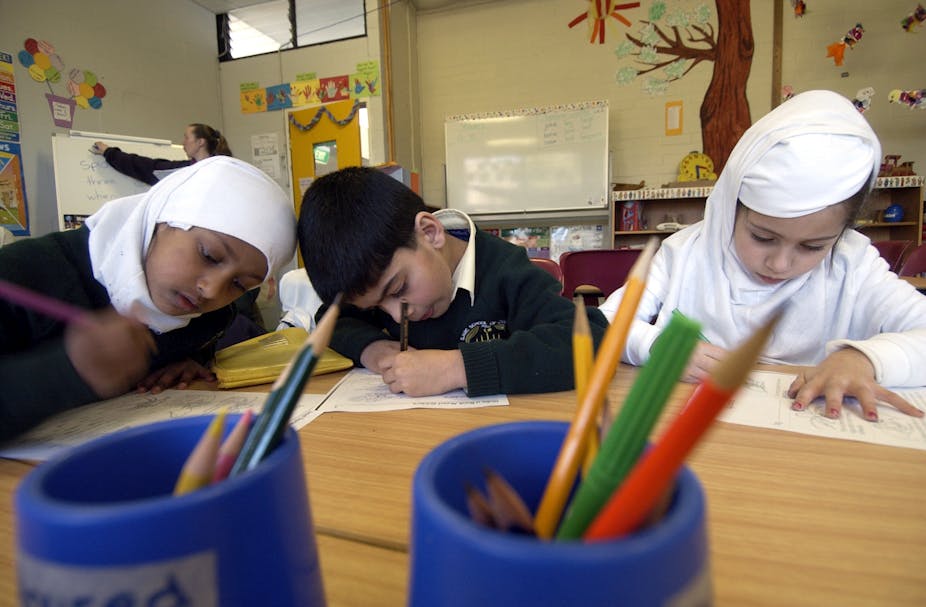Yesterday morning on ABC 720 Perth, presenter Geoff Hutchison took a talkback call from an Imam, Yahya Ibrahim, who told the listeners he is deputy principal of a local Islamic school and a chaplain at two Western Australian universities. Over the course of the phone call the Imam explained, in a calm and thoroughly poignant tone, that his school had to implement emergency, lock-down procedures this week.
He chose to not name his school for fear of being further targeted, but explained police had to be called when a gentleman in a car was noticed to be observing the school for a longer time than would be considered normal.
He went on to talk about letters he had recently received from parents at the school requesting that their children be allowed to change out of their uniforms before getting on to public transport. They were worried that the school motto (which contains the word Islam) could place their children in danger. Then he mentioned that his Perth-born wife had been scared on the weekend of going shopping alone or with her kids and had, for the first time ever, asked him to accompany her to the shops for protection.
The narrative of the Imam has a harrowing and deeply unsettling theme - that Islamophobia is growing alarmingly and openly in our society. As educators we can play a key role in countering fear-mongering and prejudice. A teacher texted the radio station with the following response, showing how empathy and creativity in the classroom could bring about positive change:
The Imam spoke so eloquently and to hear the sorrow in his voice regarding his wife’s fear makes me think back to darker days throughout history. Recently some young male high school students dressed in skirts to support their transgender friends. Wouldn’t it be great to have a day where non-Muslim women wore the hijab for a day as a show of support? Just a thought - instead of walk in my shoes, how about wear my hijab?

In the general capabilities section of the new foundation to Year 10 Australian Curriculum, “intercultural understanding” is articulated as seeking to help students learn how to “create connections with others and cultivate mutual respect”. This aim links explicitly to the Melbourne Declaration on Educational Goals for Young Australians, which views education as the principle conduit for Australia’s development as a society that is “cohesive and culturally diverse”.
Six years after that declaration was agreed, the experiences of young Muslims who no longer feel safe travelling to and from school on public transport suggests we have a long way to go in meeting those aspirations.
Unfortunately, key educators in our country, including Dr Kevin Donnelley who is a senior education researcher and co-chair of the federal government’s Australian curriculum review, are actively trying to re-shape Australian education to serve the interests of a conservative restoration. In a recent opinion piece, Donnelly started off with a divisive rhetorical question:
Now that Islamic State terrorism has arrived on our soil it’s time to ask the question: what does it mean to be Australian?
He responded with a wistful reflection of a by-gone time when Australian students
saluted the flag and sang God Save the Queen.
His arguments fit snugly into the patriotic language of the Western Australian History Curriculum of 1951, which exhorted students to:
feel a profound gratitude and deep admiration for the men who […] have made our race eminent.
Similarly, the Social and Moral Education Curriculum of 1955 required Australian children to:
accept loyalty to their country as a worthy and noble obligation.
Then Donnelly rehashed the old argument that Australian culture draws solely on the moral code of behaviour drawn from Judeo-Christian beliefs. In 2014, that is dog-whistling because it increases the acceptance of an “us versus them” mentality that seems to be growing daily in our country and is mired in a blinkered analysis of Anglo-Saxon privilege.
If we want to live in an Australia that even our arch-conservative Prime Minister Tony Abbott proclaims should be a “free, fair and multicultural society; a beacon of hope and exemplar of unity in diversity”, then educators need to step up.
We need to role model what it means to be Australian. For many of us that means recognising that the First Australians have the most legitimate claim to this nation, that the rest of us are all “those who’ve come across the sea” for “boundless plains to share” and we have a duty to welcome each other with compassion and tolerance.

